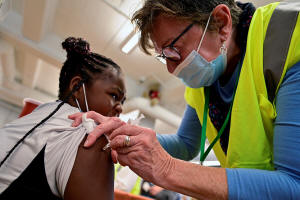Minority children in US get poorer healthcare, analysis finds
 Send a link to a friend
Send a link to a friend
 [January 18, 2024]
By Nancy Lapid [January 18, 2024]
By Nancy Lapid
(Reuters) - The quality of healthcare for minority children in the
United States is universally worse than it is for white children, even
after accounting for insurance coverage, an analysis of dozens of recent
studies found.
The pattern was similar across all medical specialties, including
newborn care, emergency medicine, primary care, surgery, hospital care,
endocrinology, mental health care, care for developmental disabilities,
and palliative care, researchers said.
Even after adjusting for type of health insurance, family socioeconomic
position, and other health conditions, the disparities were clear.
“Across multiple healthcare specialties, non-white children receive
poorer care relative to white children," study coauthor Dr. Monique
Jindal of the University of Illinois Chicago School of Medicine said in
an email.
"These differences by race and ethnicity will persist without
comprehensive changes in research, clinical practice and policy,” she
said.
The findings, which come from an analysis of more than 70 studies
published between 2017 and 2022, were reported on Wednesday in The
Lancet Child and Adolescent Health journal.

The strongest evidence of disparities was in pain management, with
minority children less likely to receive painkillers in emergency
departments for a broken limb, appendicitis, or migraine, the
researchers said.
[to top of second column]
|

A child receives a dose of the Pfizer-BioNTech coronavirus disease
(COVID-19) vaccine at Smoketown Family Wellness Center in
Louisville, Kentucky, U.S., November 8, 2021. REUTERS/Jon
Cherry/File Photo
 Among children with diabetes, those
from minority groups were less likely to be treated with an insulin
pump and to have continuous glucose monitoring, even after
controlling for insurance status, the researchers found.
Minority children also received fewer x-rays for asthma, were more
likely to have preventable and high-severity adverse events while
hospitalized, and were less likely to have their developmental
disabilities diagnosed before preschool or kindergarten.
Structural racism underlies the differences, Jindal said.
“The impacts of housing, employment, health insurance, the criminal
justice system, and immigration are impossible to disentangle and
are cumulatively responsible” for the poorer care for minority
children, she said.
(Reporting by Nancy Lapid; Editing by Bill Berkrot)
[© 2024 Thomson Reuters. All rights reserved.]This material may not be published,
broadcast, rewritten or redistributed.
Thompson Reuters is solely responsible for this content. |